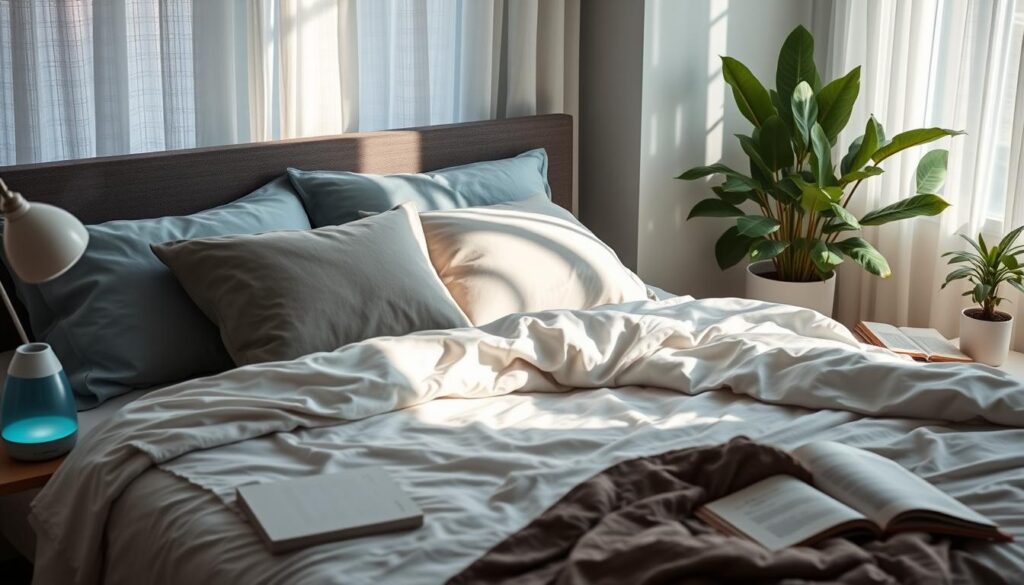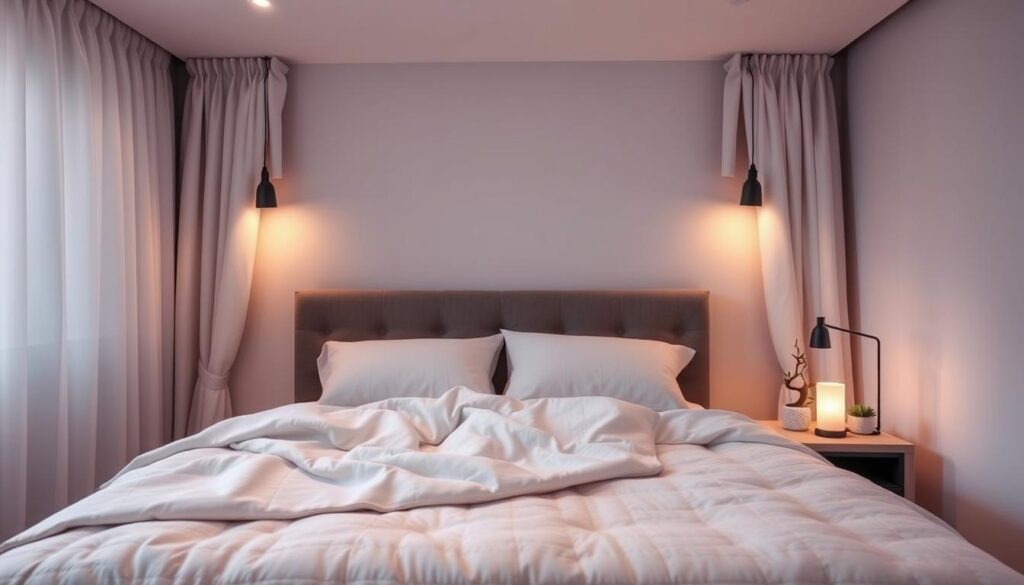Did you know that about 30% of adults sometimes can’t sleep well, and 10% always struggle with it1? Getting good sleep is key to staying healthy, affecting your heart, immune system, mood, and brain2. Learning how to sleep better can change your life, boosting both your body and mind. We’ll uncover the secrets of better sleep, showing how simple changes can help you sleep well every night.
Key Takeaways
- Approximately 30% of adults report occasional sleepless nights, while about 10% experience chronic insomnia1.
- Poor sleep is linked to increased risks of heart disease, obesity, depression, and dementia1.
- Research indicates that poor sleep can negatively affect thinking ability, mood, heart health, and immune health2.
- Consistency in sleep-wake times reinforces the body’s sleep-wake cycle, contributing to better overall sleep quality1.
- The recommended amount of sleep for adults is at least 7 hours per night13.
Understanding the Science of Sleep
Sleep is a big part of our lives, making up about one-third of our time4. We go through 4 to 5 sleep cycles each night, lasting 70 to 120 minutes45. These cycles include non-REM and REM sleep, each with its own role.
Non-REM sleep has four stages, from light to deep45. It’s key for learning and memory. REM sleep, which starts about 90 minutes into sleep, is important for thinking and emotions56.
Most adults need 7-9 hours of sleep each night6. Kids and teens need even more, around 9.5 hours6. Babies sleep the most, needing 16-18 hours a day6.
Good sleep is essential for health. Lack of sleep can lead to high blood pressure, heart disease, diabetes, depression, and obesity6. Missing just one night of sleep can make healthy people feel like they have diabetes4.
Circadian rhythms help us sleep well by following our natural clock6. People without sight often have trouble sleeping because they can’t see light4. Stress and hunger can also mess with sleep, causing insomnia5.
Hormones like melatonin, cortisol, and adrenaline control when we sleep and wake5. Melatonin goes up in the evening to help us sleep5.
Establishing a Regular Sleep Routine
Getting a regular sleep routine is key for good rest and health. It helps your body’s clock stay in sync. This leads to better sleep and health in mind and body.
Why a Set Sleep Schedule Matters
Adults need at least seven hours of sleep for health. Kids need even more, based on their age7. Sticking to a sleep schedule can make you sleep 20% longer on average. This boosts alertness and safety89.
Those who sleep at the same time every day sleep better by 30%8. If work or family messes up your sleep, adjust your schedule by 15 to 30 minutes. This helps your body adjust7.
Sleeping in on weekends can help make up for lost sleep. You can sleep an extra 1-2 hours to pay back your sleep debt9.
Tips for Maintaining Consistency
Keeping a regular sleep schedule improves sleep hygiene and quality. Here are some tips:
- Stick to a bedtime and wake-up time, even on weekends, to keep your sleep pattern stable7.
- Being in natural light in the morning helps your internal clock7.
- Don’t use screens before bed to avoid blue light’s sleep impact7.
- Do relaxing activities before bed to fight insomnia8.
- Avoid caffeine and big meals before bed for better sleep7.
Following these tips helps set up good sleep habits. It also keeps you on track with sleep hygiene. This boosts mental health and overall well-being79.
Creating a Sleep-Friendly Environment
Getting better sleep is key to feeling good all day. A cozy sleep space helps you sleep well. It’s important for a good night’s rest.
Optimizing Your Bedroom Setup
Your bedroom setup is crucial for a good night’s sleep. A medium-firm mattress is best, as 56% of people say it improves sleep10. The right pillow is also important, as 40% of people get neck pain from the wrong one10.
Replacing old mattresses with new ones can also help. It can ease back pain and make sleep better11.
The room’s temperature is also key. It should be between 60 to 67 degrees Fahrenheit for the best sleep10. Keeping it around 65 degrees is best for a good night’s sleep11.
| Sleep Environment Factor | Optimal Condition | User-Reported Improvement |
|---|---|---|
| Mattress Firmness | Medium-Firm | 56%10 |
| Room Temperature | 60-67°F | 75%10 |
| Pillow Choice | Comfortable and Supportive | 40% (Neck Pain Reduction)10 |
| New Mattress | Yes | Better Sleep Quality11 |
Importance of Light and Noise Control
Light in the evening can disrupt sleep. Light sources with a lux of 10 or higher can cause more wake-ups11. A dark room can improve sleep by up to 30%10.
Controlling noise is also vital. Strategies to reduce noise can increase deep sleep by up to 45%10. A white noise machine can block out noise and improve sleep by up to 75%11.
Keeping your bedroom quiet can also help. Positioning your bed away from shared walls can reduce wake-ups by about 20%10. Regular cleaning can also help keep your sleep space healthy11.
By focusing on these areas, you can improve your sleep and enjoy better nights.
The Role of Diet and Nutrition in Sleep Optimization
Diet and nutrition are key to better sleep. They help keep a good sleep routine and improve sleep hygiene. Eating the right foods and avoiding bad ones can make a big difference.
Foods to Avoid Before Bed
Some foods and drinks can mess with our sleep if we eat them too close to bedtime. Caffeine in coffee, tea, and chocolate should be cut out six hours before bed. It can make it hard to fall asleep and sleep well12. Alcohol might make you feel sleepy at first but can mess up your sleep later12. Foods high in saturated fats and sugar can also hurt your sleep quality12.
Eating too little sleep can lead to eating more sugary and fatty foods. This can hurt your sleep and make you gain weight12. Staying away from sugary and high-carb foods before bed helps keep your sleep better.
Nutritious Choices for Better Sleep
Eating foods that help sleep is good. Foods like tart cherry juice, kiwis, and oily fish like salmon can improve sleep. They have melatonin and omega-3 fatty acids12. Foods like poultry, milk, cheese, and eggs have tryptophan, which helps you relax and sleep.
Eating a balanced diet with proteins, carbs, and fats is important for good sleep12. Foods low in fiber and high in sugar can hurt your sleep. So, eat more fiber-rich foods like veggies, beans, and whole grains12.
- Avoiding caffeine and alcohol before bedtime.
- Opting for fiber-rich foods and lean proteins.
- Incorporating melatonin-rich foods like kiwi and tart cherry juice.
- Balancing intake of carbohydrates, proteins, and fats.
Short sleepers eat less varied diets and get fewer nutrients13. Skipping breakfast and eating irregularly can also hurt your sleep13.
To support good sleep, watch what you eat. Avoid bad foods and choose healthy ones. This can greatly improve your sleep and health.
Exercise and Physical Activity’s Impact on Sleep Quality
Regular exercise is key to better sleep. It changes how we sleep and makes nights more restful. Knowing the right time and type of exercise is crucial.
Timing Your Workouts
When you work out affects your sleep. Exercise makes your body warm, which keeps you awake. But, this warmth goes down after 30-90 minutes, helping you sleep14.
So, it’s best to exercise early in the day. People who work out 1 to 2 hours before bed sleep better14. Also, those with insomnia who exercised for 30 minutes three times a week for eight weeks slept better15.
Incorporate Gentle Exercises
Gentle exercises also help sleep. Activities like light jogging or brisk walking increase slow-wave sleep. This is important for brain and body recovery14.
Yoga or stretching also helps. They help you relax and clear your mind, making it easier to fall asleep14. People who did 31.2 minutes of low-intensity activity daily slept better and got more sleep16.
A study found that 30 minutes of moderate exercise can improve sleep quality right away14. Even a little exercise can make you feel better, showing its big mental benefits16.
This shows why exercise is important. It not only helps you sleep better but also boosts your overall health.
Managing Stress for Improved Sleep
Managing stress is key for good sleep and well-being. High stress can hurt sleep quality, with 60% of adults saying it disrupts their sleep17. So, using stress-reduction methods is helpful.
Stress-Reduction Techniques
Yoga, tai chi, and meditation can improve sleep by lowering stress hormones18. Regular exercise also helps, reducing stress by about 30% and improving sleep17. Around 22% of adults use relaxation techniques to manage stress and sleep better17.
| Technique | Benefits |
|---|---|
| Yoga | Reduces stress hormones and improves sleep quality |
| Tai Chi | Promotes relaxation and reduces emotional stress |
| Meditation | Encourages mindfulness and improves mental well-being |
| Physical Activity | Lowers stress levels and enhances sleep hygiene |
| Breathing Exercises | Immediate relaxation and stress relief |
Importance of Mental Relaxation
Mental relaxation is vital for good sleep and health. About 44% of adults have sleepless nights due to stress at least once a month18. Daily relaxation techniques, like muscle relaxation and breathing exercises, can reduce stress18.
These exercises can lead to fewer sleepless nights. Remember, delegating tasks and getting social support can also lower stress by up to 35%, improving sleep17. Good mental relaxation is crucial for quality sleep.
The Power of a Bedtime Routine
Creating a bedtime routine is key to better sleep. It should happen 30 to 60 minutes before bed. This helps both kids and adults sleep better, every night.
Calming Activities Before Bed
Doing calming things before bed is essential. Journaling or making a to-do list for five minutes can help you fall asleep faster19. Eating fruits like cherries or drinking herbal teas like chamomile can also make your sleep better19.
Reading or singing are popular bedtime activities for 60% of families20. These activities help make bedtime more peaceful.
Consistency and Routine
Being consistent is crucial for a good bedtime routine. Regular yoga can improve sleep quality19. Over 71% of families with young kids stick to their bedtime routine most nights20.
Things like race and income level can affect bedtime routines20. It’s also good to avoid screens before bed because they can mess with your sleep19.
| Activity | Benefits | Statistics |
|---|---|---|
| Journaling | Quickens sleep onset | 5 minutes before bed recommended19 |
| Consuming Specific Foods | Improves sleep quality | Fruits like cherries and grapes19 |
| Yoga | Enhances sleep quality | Regular practice advised19 |
| Avoiding Electronics | Reduces blue light exposure | Evenings without devices19 |
| Adaptive Routines | Creates peaceful environment | 60% reading or singing families20 |
These tips show how important a bedtime routine is. It helps everyone sleep better. Adding these habits can greatly improve your sleep.
Sleep Optimization Tips and Tricks
More than one-third of American adults don’t get enough sleep regularly. This shows we need good sleep optimization methods21. Good sleep hygiene is key to better sleep quality and quantity22. It starts with simple steps.
Keeping a regular sleep schedule helps your body’s internal clock. This can lower sleep disorder risks by up to 30%21. Regular exercise, like 150 minutes a week, can also improve sleep by up to 65%21. But, it’s important to exercise during the day to help your body’s rhythm22.
For a better sleep environment, keep your bedroom dark. This can boost melatonin production, helping 90% of people sleep better21
Good sleep hygiene also means avoiding screens before bed. Cutting down on screen time by at least an hour can improve sleep by up to 40%21. Avoid caffeine after 3 PM and heavy meals in the evening. These can disrupt sleep3. Calming scents and white noise machines can also help improve sleep quality22.
Keeping a sleep journal can help you understand your sleep patterns3. Chiropractic care and proper sleeping positions can also reduce pain, improving sleep21. Short naps in the afternoon are okay, but avoid them at night3.
| Sleep Optimization Tips | Benefits |
|---|---|
| Consistent Sleep Schedule | Reduces risk of sleep disorders by 30% |
| 150 minutes of exercise weekly | Improves sleep quality by 65% |
| Dark Bedroom Environment | 90% report better sleep |
| Ideal Room Temperature (~65°F) | Enhances sleep comfort |
| Reduced Screen Time | Improves sleep onset and duration by 40% |
By following these sleep tips, you can make your sleep more restful and refreshing. This sets the stage for better health and well-being.
Use of Supplements and Natural Remedies
Many people have trouble sleeping and look for natural ways to help. It’s important to know the good and bad of these supplements for better sleep. Let’s look at melatonin and other sleep helpers.
Melatonin and Its Effects
Melatonin supplements are often used to help sleep. The right dose is usually 3 to 10 mg before bed23. Some say 1-3 mg taken 2 hours before bed works best24. Melatonin is safe for short-term use in adults, but long-term effects are still unknown23. Eating tart cherries, a natural melatonin source, can also boost sleep quality24.
Other Helpful Sleep Aids
Valerian root is a favorite herbal supplement for better sleep. It’s best taken in 300-600 mg doses up to 2 hours before bed24. A study found that 530 mg of valerian root per night for 30 days improved sleep quality23. Another study showed valerian reduced sleep latency and improved quality25. But, valerian’s long-term safety, like for pregnant or nursing women, is still a concern23.
Magnesium supplements, 225-729 mg daily, can also improve sleep23. Women need 310-320 mg and men 400-420 mg of magnesium daily for sleep24. Mixing magnesium with melatonin can make sleep even better23.
Lavender aromatherapy is another natural sleep aid. A study found people slept better in a room with lavender than without24. Passionflower tea has also been shown to enhance sleep quality, with sleep ratings going up by about 5% after a week23.
Here’s a look at the dosages and benefits of some key sleep supplements:
| Supplement | Recommended Dosage | Benefits |
|---|---|---|
| Melatonin | 3-10 mg | Improves sleep onset and duration |
| Valerian Root | 300-600 mg | Reduces sleep latency, enhances sleep quality |
| Magnesium | 225-729 mg | Improves sleep quality |
| Passionflower | Tea or extract form | Improves sleep quality |
| Lavender | Aromatherapy | Enhances deep sleep |
While supplements can help with sleep, they should be used carefully. It’s best to talk to a healthcare professional first to avoid side effects and interactions.
When to Seek Professional Help
Knowing when to get help for sleep problems is key. Early action can greatly improve your sleep and health.
Recognizing Sleep Disorders
Signs of sleep disorders include daytime tiredness and loud snoring. If you fall asleep during meetings or driving, see a doctor26. People with high blood pressure or obesity should also get checked for sleep apnea27.
Daytime sleepiness can cut work productivity by 30% and raise accident risks27. It affects your work and life quality.
Consulting with a Healthcare Provider
If you think you have a sleep disorder, see a doctor. Places like the Center for Sleep Disorders at Jersey City Medical Center offer tests and treatments for those 5 or older26. Losing weight and exercising can also help sleep apnea symptoms by 20-30%27.
Untreated sleep disorders can lead to serious health issues. Getting help can improve your sleep and overall health. Following treatment plans can greatly enhance your sleep quality and health.
Conclusion
Improving sleep is key to better health and happiness. Knowing how routine, environment, diet, and exercise affect sleep is vital. In the U.S., 30% to 50% of adults struggle with sleep issues like insomnia22.
Keeping a regular sleep schedule boosts sleep quality by 40%22. A cool bedroom, around 65°F, helps you fall asleep 50% faster22. Regular exercise also improves sleep quality by 65%, showing the importance of movement22.
Reducing caffeine and practicing relaxation before bed can improve sleep by 20%22. Calming scents like lavender can lower anxiety by 30%, helping you sleep better22. Treating sleep as a priority is like eating well or staying connected with friends. It’s essential for a healthy lifestyle28.
FAQ
What is sleep optimization?
How can I improve my sleep quality?
What does a healthy sleep routine look like?
Are there specific tips for relieving insomnia?
Why is a set sleep schedule important?
What sleep hygiene practices should I follow?
How can I create a sleep-friendly environment?
Which foods should I avoid before bed?
How does exercise impact sleep quality?
What stress-reduction techniques can improve my sleep?
What are the benefits of a consistent bedtime routine?
How does melatonin work as a sleep aid?
When should I seek professional help for my sleep issues?
Source Links
- 6 steps to better sleep – https://www.mayoclinic.org/healthy-lifestyle/adult-health/in-depth/sleep/art-20048379
- 15 Proven Tips to Sleep Better at Night – https://www.healthline.com/nutrition/17-tips-to-sleep-better
- 20 Tips for How to Sleep Better – https://www.sleepfoundation.org/sleep-hygiene/healthy-sleep-tips
- The Science of Sleep: Understanding What Happens When You Sleep – https://www.hopkinsmedicine.org/health/wellness-and-prevention/the-science-of-sleep-understanding-what-happens-when-you-sleep
- How Sleep Works: Understanding the Science of Sleep – https://www.sleepfoundation.org/how-sleep-works
- Brain Basics: Understanding Sleep – https://www.ninds.nih.gov/health-information/public-education/brain-basics/brain-basics-understanding-sleep
- How to Fix Your Sleep Schedule – https://www.sleepfoundation.org/sleep-hygiene/how-to-reset-your-sleep-routine
- Creating a Sleep Routine – 6 Steps to Better Sleep – https://hr.wustl.edu/creating-a-sleep-routine-6-steps-to-better-sleep/
- Setting a Regular Sleep Schedule – National Sleep Foundation – https://www.thensf.org/setting-a-regular-sleep-schedule/
- How to Make a Sleep-Friendly Bedroom – National Sleep Foundation – https://www.thensf.org/how-to-make-a-sleep-friendly-bedroom/
- Bedroom Environment: What Elements Are Important? – https://www.sleepfoundation.org/bedroom-environment
- Nutrition and Sleep: Diet’s Effect on Sleep – https://www.sleepfoundation.org/nutrition
- Effects of Diet on Sleep Quality – https://pmc.ncbi.nlm.nih.gov/articles/PMC5015038/
- Exercising for Better Sleep – https://www.hopkinsmedicine.org/health/wellness-and-prevention/exercising-for-better-sleep
- The Effect of Physical Activity on Sleep Quality and Sleep Disorder: A Systematic Review – https://pmc.ncbi.nlm.nih.gov/articles/PMC10503965/
- The effects of physical activity on sleep architecture and mood in naturalistic environments – Scientific Reports – https://www.nature.com/articles/s41598-024-56332-7
- Sleep Better with Less Stress – https://www.webmd.com/sleep-disorders/tips-reduce-stress
- Sleepless Nights? Try Stress Relief Techniques – https://www.hopkinsmedicine.org/health/wellness-and-prevention/sleepless-nights-try-stress-relief-techniques
- Bedtime Routines for Adults – https://www.sleepfoundation.org/sleep-hygiene/bedtime-routine-for-adults
- Benefits of a bedtime routine in young children: Sleep, development, and beyond – https://pmc.ncbi.nlm.nih.gov/articles/PMC6587181/
- Sleep Optimization Tips – https://texstarchiropractic.com/sleep-optimization-tips/
- Mastering Sleep Hygiene: Your Path to Quality Sleep – https://www.sleepfoundation.org/sleep-hygiene
- Natural Sleep Aids to Help You Get More Zzz’s – https://www.healthline.com/nutrition/sleep-aids
- Natural Sleep Remedies – https://www.webmd.com/sleep-disorders/ss/slideshow-natural-sleep-remedies
- Herbal and Natural Supplements for Improving Sleep: A Literature Review – https://pmc.ncbi.nlm.nih.gov/articles/PMC11321869/
- When to see a sleep specialist – https://www.rwjbh.org/blog/2020/january/when-to-see-a-sleep-specialist/
- The Importance of Seeking Professional Help for Sleep Disorders | Allure Dental Fulton, MD – https://www.alluredentalofmaplelawn.com/blog/the-importance-of-seeking-professional-help-for-sleep-disorders/
- The Sleep Conclusion – Performance Training Systems – https://www.performancetrainingsystems.com/the-sleep-conclusion/





